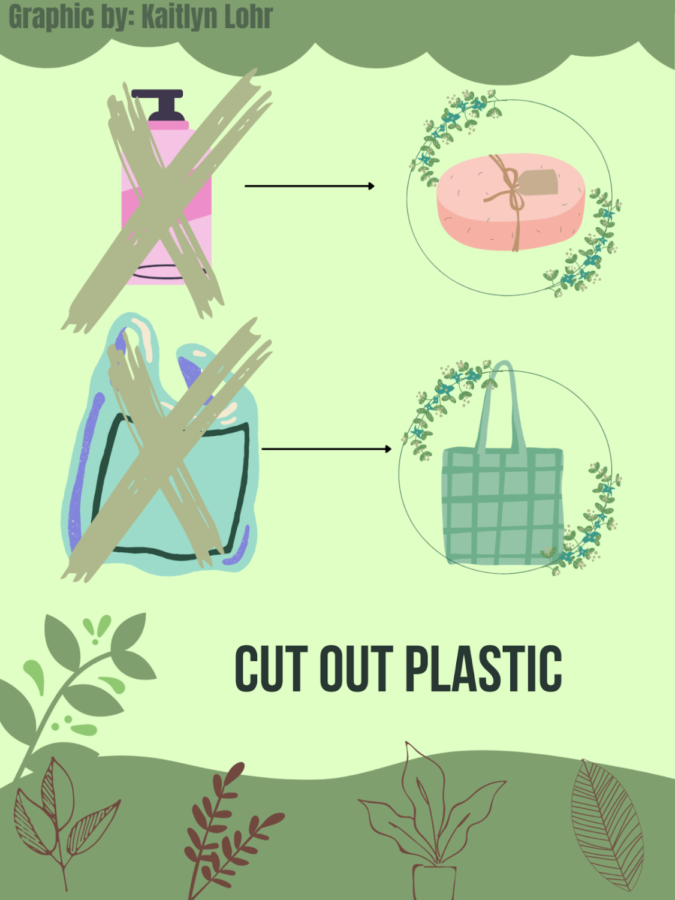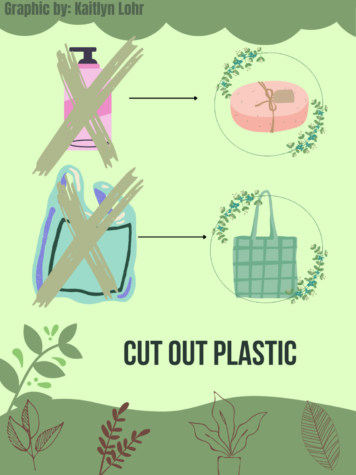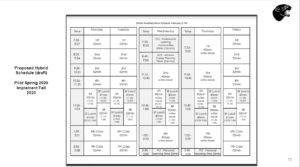Ethical and Eco-Friendly Living
January 20, 2022
As a country, America has made commendable strides in taking control of climate change. Individually, however, there are still many changes we can make to improve the earth we inhabit. These changes can range from rather large investments, such as installing solar panels, to miniscule adjustments to the products we buy and where we buy them. Living completely eco-friendly is nearly impossible in today’s world, but we all have the ability to reduce our carbon footprint, even if it is only slightly.
Wasteful Wasting
In America we produce a lot of waste. In fact, according to an EPA report entitled, “Facts and Figures about Materials, Waste and Recycling”, we produce an average of 4.9 pounds per person every day, which is a lot when you consider how many people live in the United States. There are many similar startling statistics in the report as well; statistics that spark realizations concerning how we, as Americans, live in today’s society and how much waste we really produce. In 2018, not too long ago, the EPA reported that 292.4 million tons of waste was produced in the U.S.. Of that waste, around 69 million tons were recycled and 25 million tons were composted, which translates to a 32.1% recycling and composting rate. This percentage has certainly increased over the years – in 1980 the rate sat at only 10% – but there are still improvements to be made.
The category that had the largest percentage of all waste was paper and paperboard products. These products took up 23.1% of waste, which is not surprising considering the amount of paper we use as packaging, especially since online shopping has become an integral part of our society due to COVID.
Food waste was the fourth largest category, with a percentage of 21.6% of all waste. This percentage is definitely something to be reduced as well. Tons of food gets thrown in the garbage every day, with reasons ranging from not wanting to eat it because it looks funny to impulse buys that were never eaten. Food is precious, and, as you’ve most likely heard many times before, there are some people that cannot afford to eat every day.
Plastic products came totaled at 12.2%, which is also not especially shocking. Plastic is one of the main materials that we need to cut down on using. Plastic can take around 1000 years to decompose, according to a report by ACS Publications, and threaten the ecosystem in terms of harming curious animals. It will be near impossible to cut plastic completely out of our lives, but reduction is also a vital part to living eco-friendly.
Coming in next in terms of tons of waste generated is a surprising contestant, that contestant being yard trimmings. About 12.1% of waste consisted of yard trimmings, around 12 tons of which were not composted. Yard trimmings can be composted, and composting them, as long as there aren’t too many chemicals in the grass, can greatly enhance your or the town’s compost.
Although the rate of landfilled materials has decreased from 94% in 1960 to 50% in 2018, we can do better. Composting and recycling are not the only ways to reduce the amount of waste we landfill, either. There are many ways to live more sustainably to ensure that future generations also have a healthy planet to call home.
Reduce and Reuse
We’ve all most likely heard the phrase: Reduce, Reuse, Recycle, but many people tend to focus on ‘recycle’ more than the 2 former Rs. Reducing what we are using and reusing what we already have are two measures one can take that can drastically reduce the amount of waste we produce.
Before recycling or composting, consider reducing and reusing. Both can be achieved simply by swapping out items. A lot of easy swaps are available for use, and some are even cheaper than what you would regularly buy! You can find these swaps from a variety of resources. An article entitled “100+ Easy Ways to Be More Eco-Friendly” from Pelacase.com contains a ton of good suggestions such a
Write down what is inside of your fridge before you go grocery shopping! Plan meals around the food that needs to be eaten first.
E-books and Audio Books! Reduce paper, shipping and water waste by using E-books and Audio books. You can rent new and favourite books for free on apps such as Libby or support the author by buying the downloadable copy.
Say no to plastic straws. Instead, opt for a reusable glass or metal straw that you can use over and over again! You can even try using a collapsible straw for when you’re on the go.
Unplug your devices to prevent phantom electricity from being consumed.
Buy several reusable water bottles and keep them full of filtered water so you can grab and go and be out the door.
Bring your own bags to all stores like pet stores, hardware stores, grocery stores, etc.
Bring your own cloth produce bags to the grocery store or the farmers market.
Opt for a bamboo toothbrush. My favorite is Brush with Bamboo.
Opt for products in glass instead of plastic.
There are many other simple tips like these in an amazing amount of resources, and the swaps not only save the planet, but can also save your wallet, too. Other strategies to reduce waste include things like never going to the grocery store hungry to prevent spur-of-the-moment buys because what you bought looked good at the time and waiting on certain purchases, such as things you already have and if what you are considering buying will even fit in your home.
Some SPASH students are already living eco-friendly, such as Natalie Berk, a senior at SPASH. Natalie and her family already compost, and along with that they have made a lot of swaps in terms of the products they use. She says she uses “Eco-friendly products, reusable plastic bags, shampoo bars instead of containers, and carpooling” to help reduce her carbon footprint.
Some of these changes are not easy to stick to, but others can be. Recycling and composting are not the only ways to live ethically, and there are so many resources when it comes to environmentally friendly products and services.
Ethical Ways To Shop
In Stevens Point we have a wide variety of options when it comes to local businesses, thrift stores, and natural goods and commodities. Shopping at small businesses has many advantages such as helping the local economy and reducing your carbon footprint. For example, would you rather buy produce that was grown by farmers in Stevens Point or produce that was grown across the country and transported by truck or plane? If you take a walk downtown you will see so many small businesses whose carbon footprints are astronomically smaller than those of chain stores.
Small businesses in Stevens Point include: the Stevens Point Co-op (an organic grocery store), Kindred Spirit Books, Emy J’s and Ruby Coffee Roasters, and the local farmers market, all of which have good reviews on google and all of which play an important role in downtown Stevens Point.
There are certain brands and stores that are specifically eco-friendly as well. There are websites such as Earthhero.com and Thrive Market, as well as countless others, that boast of their environmentally friendly ways. But it is important, nonetheless, to be careful about where you order from. Do your research, or your money will be going down the drain.
Bigger Changes You Can Make
If you’re searching for a way to radically reduce your carbon footprint you may be looking into some bigger changes than buying bars of soap instead of bottles. Luckily there are many large-scale lifestyle choices to invest in if that is the route you wish to take.
There is, first and foremost, composting. There are many reasons that people may not want to compost. People may say that it smells or it’s too much work, but the benefits of composting can be overwhelming both on the environment and on personal lives. Composting should especially be considered if you or a close friend or family member has a garden onto which the composted material can be spread. In addition, composting sounds harder than it actually is. All you need is a bucket or bin, or even just a pile in the yard, to store your compost. You may also want to add worms, which aid in decomposing food waste. All you have to do is take your food scraps and add it to your compost – but be sure what you have is compostable first! A helpful guide from dontwastethecrumbs.com describes items that are safe for composting, including, “Kitchen waste – Mainly produce trimmings. Think onion skins, celery roots…apple cores, banana peels, potato peels. Coffee grounds, Tea bags, Grass clippings, Dead leaves, Straw, Sawdust, Garden waste,” and also has a helpful list on what you should definitely not compost. This list includes, “Meat or bones…Leftovers that aren’t primarily plant material, Tougher plant material from your garden like branches or stalks (it takes too long to break down), Garden waste that has been treated with pesticides or chemical fertilizer, Weed seeds and roots.” Natalie Berk, whose family composts, also added that eggshells can be composted, and to avoid composting dairy and too much citrus – although a little is fine. After that, every month or so turn your compost pile to mix up all the scraps (this can also help reduce odors), and soon the bottom of your compost pile will begin to resemble rich soil. At that point you can harvest the soil that came from your compost, take out any recognizable scraps and put them back in with the rest of the compost, and spread the soil over any garden. Composting can be hard at times, but if you’re a gardener that grows your own vegetables or even someone who just has a small garden inside their house, you can kill two birds with one stone – reducing your carbon footprint and improving the quality of your garden.
Another large-scale project you can take on is installing solar panels. In Wisconsin, where it snows almost half of the year, this may not be your first choice – which is understandable. But if you are willing to clean them off and take care of maintenance, switching to solar energy can be a great way to reduce your carbon footprint. As a plus, the cost of solar panels has decreased significantly over the years. Nowadays they can range anywhere from $5,000 for a smaller system to $40,000 for high-quality solar panels according to consumeraffairs.com. It could be a big investment, especially if you tend to use a lot of energy. In that case, solar panels will buy themselves back with the money you save on your electricity bill.
If these suggestions are not quite what you’re looking for, then consider gardening. Gardening takes lots of time and effort, but you get to eat and enjoy whatever your labor has produced. Gardening also reduces how many fruits and vegetables you buy from grocery stores – the fruits that were grown across the country and stuffed with preservatives and bred selectively for looks. Although, if you really wanted to stop buying fruits and veggies from the grocery store , then the local farmers market is also a good choice.
Conclusion
Ethical living oftentimes seems unachievable, especially when there are so many easier, cheaper, and more convenient alternatives. With dedication and vigilance about the products and the stores you buy them from, as well as how you live in general, we can all improve the quality of our planet. We, as a society, can heal the earth that both us and past generations have hurt. As Natalie Berk explains, “It’s okay to start small with just one thing, like a reusable straw, and then slowly start buying more reusable products until it becomes a lifestyle.” And it can become a lifestyle. Next time you go to the store, just try to make one eco-friendly choice. We can do it together.






































































